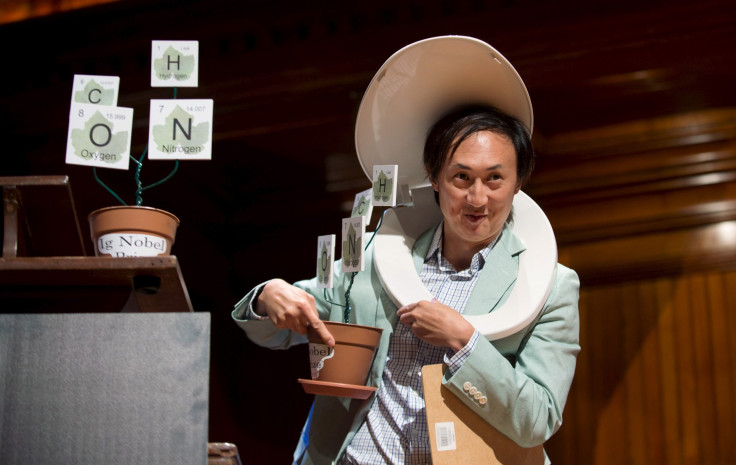Study of mammals’ pee and recipe for un-boiling egg win 2015 Ig Nobel Prize awards

A team that showed that almost all mammals take the same amount of time to urinate has been recognised at the 2015 Ig Nobel Prizes held at Harvard University.
Researchers from the Georgia Institute of Technology bagged this year’s physics prize for analysing the biological principle that nearly all mammals empty their bladders in about 21 seconds, plus or minus 13 seconds. They are among the 10 new winners of the annual ceremony touted as the parody of the Nobel Prizes: the Ig Nobel Prizes.
Now on its 25th year, the Ig Nobel Prizes honours achievements that first make people laugh then make them think, according to the science humour magazine Annals of Improbable Research. The annual event seeks to celebrate the unusual, honour the imaginative and spur people’s interest in science, medicine and technology. The awards are physically handed out by genuine Nobel Laureates.
In the mammal’s urine study, the team, led by Patricia Yang, a PhD student in mechanical engineering, used high-speed video analysis to model the fluid dynamics involved in urination. They discovered that all mammals weighing more than 3 kilogrammes, such as rats, goats, cows and elephants, empty their bladders for about 21 seconds. Yang and her team hope that their findings, published in the journal PNAS, inspire smarter engineering for water tanks and reservoirs as well as fire hoses and water-filled backpacks.
The chemistry prize, meanwhile, was awarded to a team for inventing a chemical recipe to partially un-boil an egg. The findings, according to the researchers from the University of California Irvine, have effects that go beyond kitchen use. They have huge implications for cancer treatments, biotechnology and a broad range of food production processes, the researchers claimed.
Lead research author Gregory Weiss said their discovery is significant because a hard-boiled egg white represents proteins that have been cooked, tangled up and irreversibly changed. The cooked egg, when added with a urea substance and put under a high-powered machine called a vortex fluid device, has its proteins forced apart into their untangled, reusable form. According to the researchers, this method could revolutionise industrial and research production of proteins, which may be needed for a vast range of scientific and manufacturing processes.
Meanwhile, the literature prize went to the team that discovered that the word “huh?” or its equivalent seems to exist in every human language. Another team was awarded the management prize for their findings that many business leaders develop in childhood a fondness for risk-taking after experiencing natural disasters that for them had no dire personal consequences. The Bangkok Metropolitan Police in Thailand also bagged the coveted economics prize for creating a policy of offering extra cash to police officers who refuse to take bribes.
Other prizes given include the medicine Prize, which was awarded to a team for their study on the biomedical benefits of intense kissing and other intimate, interpersonal activities; the diagnostic medicine prize, which was awarded to researchers who determined that acute appendicitis can be accurately diagnosed by the amount of pain evident in the patient as he or she is driven over speed bumps; and the mathematics prize, which was presented to the team that tried to use mathematical techniques to determine whether and how Moulay Ismael the Bloodthirsty, the Sharifian emperor of Morocco, managed to father 888 children.
The biology prize went to the team which observed that when one attaches a weighted stick to the rear end of a chicken, the chicken then walks in a manner similar to how dinosaurs are believed to have walked.
Meanwhile, two winners received the physiology and entomology prize; the first individual was recognised for painstakingly creating the Schmidt Sting Pain Index, which rates the relative pain people feel when stung by various insects, while the other award was given to another person for carefully arranging for honeybees to sting him repeatedly on 25 different locations on his body, to learn which locations are the least and most painful.
Contact the writer at feedback@ibtimes.com.au or tell us what you think below.





















